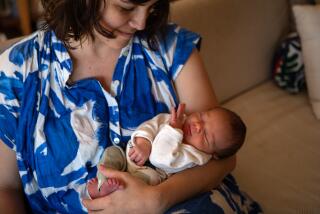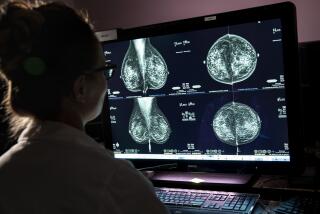U.S. Panel Urges HIV Tests for All Pregnancies
- Share via
WASHINGTON — A federal panel is recommending that all pregnant women, not just those considered at high risk, be screened for the AIDS virus because testing has proven so successful at helping to prevent the spread of the disease to babies.
The U.S. Preventive Services Task Force said in 1996 that there was insufficient evidence that screening all pregnant women had any benefit. But the independent panel of medical experts said in today’s issue of the Annals of Internal Medicine that scientific advances had changed that.
“We’re hoping that this will encourage women to think of HIV testing during pregnancy the way they think of all other testing during pregnancy,” said Dr. Diana Petitti, the task force’s vice chairwoman and a scientific advisor for Health Policy and Medicine for Kaiser Permanente Southern California.
HIV-infected pregnant women can be given combination drug therapies, have caesarean sections or avoid breast-feeding to help keep their babies safe -- reducing the risk of transmission to as low as 1%, the task force said.
Otherwise, infected women have a 1 in 4 chance of passing HIV on to their babies. Of the 4.7 million women hospitalized for pregnancy or childbirth in 2002, about 6,300 had HIV.
The recommendation follows a 2001 directive by the federal Centers for Disease Control and Prevention that emphasized HIV testing “as a routine part of prenatal care and strengthened the recommendation that all pregnant women be tested for HIV,” said CDC spokeswoman Jessica Frickey.
Sharon Hillier, a professor of obstetrics, gynecology and reproductive sciences at the University of Pittsburgh School of Medicine, said there were many women who didn’t know they had the virus. “It’s astonishing how people still don’t understand that this can happen to almost anybody,” Hillier said.
About 40,000 Americans are infected with HIV each year, and about 27% of those are women. Many pregnant women are offered the tests but turn them down. Petitti said women needed to know that new HIV tests were virtually 100% accurate and that there was no shame in acknowledging they might be at risk.
Hillier said the more universal that testing became, the less stigma there would be.
In addition to its recommendations about pregnant women, the task force reaffirmed its recommendation that adolescents and adults at increased risk for HIV be tested.
The task force broadened its definition of high risk to include those getting care at homeless shelters or clinics specializing in the care of sexually transmitted diseases.






